In Conversation... with Dr Keith Ooi

Doctors from Sydney Children’s Hospital in Randwick, Dr Keith Ooi, Clinical Academic and Consultant in Paediatric Gastroenterology and Michael Coffey, Paediatric Registrar, are the founders of PlayMed, an online gaming platform which helps junior Australian doctors become better practitioners through a fully immersive gaming experience. Following their own experiences in both academia at the University of NSW as lecturers and in practice, both Ooi and Coffey created PlayMed, in their words, “a ‘virtual hospital’ to help medical students learn through experience, helping them to be better equipped for their first foray into the medical world”. We sat down with Dr Ooi to better understand the thinking and development behind PlayMed.
What inspired you both to pursue this?
We’ve always had a passion for education and identified a gap in the application of serious games in medical education. I (Dr Ooi) was the former pediatric course convener (Phase 3) for the School of Women’s and Children’s Health, Faculty of Medicine, University of New South Wales (UNSW) and observed that students were still being taught the same way when I was a medical student (and that is way too long ago!).
Bedside teaching is a vital component of medical education but can be challenging. There is now a need to teach very large numbers of students and bedside teaching can be daunting to the infant or young child. A learning tool that allows experiential and immersive learning in a safe and virtual environment was lacking.

Can you tell me about the gaming platform you use for PlayMed?
Essentially, we developed a virtual children’s hospital that allows students to utilise experiential learning in a highly immersive environment, online. Our platform, PlayMed, has been noted by many to be similar to the Sims computer game. Sims is a highly popular computer game where the user controls a range of characters in a ‘game of life’ style experience. PlayMed is very different to Sims in that it’s a highly immersive learning experience for students. However, both Michael and I actively play computer games to keep our inner children happy and felt this was a highly engaging way to get students involved in their learning.
How did you develop the program?
We developed the program in conjunction with Lionsheart Studios. This was only possible with funding support from the Learning and Teaching Grant, UNSW and School of Women’s and Children’s Health, Faculty of Medicine, UNSW. After many hours of collaboration with Lionsheart, they were able to build the hospital environment online and provide us with a platform to develop the paediatric cases for medical students to manage.

How have you been testing PlayMed and what’s the response been by students so far?
We conducted a case-control study (of PlayMed game vs standard teaching) among final-year medical students at UNSW and found a significant increase of 25% in knowledge. Overall, the group of students who played PlayMed had a positive shift in their knowledge compared to those not exposed to PlayMed. We also conducted a survey on the students who underwent this study. The vast majority felt the game helped improve their understanding of the topic and will help them prepare and deal with real-life clinical scenarios.
Why do you think it resulted in such an increase in learning?
We feel the results were so dramatic because we were able to engage students in a new and interesting way. Furthermore, PlayMed allows students to explore experiential learning, this allowing them to make management decisions and get feedback on their correct and incorrect decisions.
What’s next for PlayMed?
We intend on integrating PlayMed into the curriculum at UNSW over the next one to two years and we have also had interest from other Australian universities to incorporate this technology into their schooling.
We also have several future plans and directions. This includes developing more extensive content to cover the most common paediatric conditions relevant for medical students. We have been grateful to receive support from the Pro Vice Chancellor, Education (PVCE) Portfolio at UNSW to enable this. Beyond this we will explore the development of content relevant to nursing staff, junior doctors and allied health staff.

Some patients wait 6 years to see a public hospital specialist. Here's how to fix this
Australian research spanning more than a decade suggests there are ways to reduce waiting lists...
Reusing medical equipment is good for the planet. But is it safe?
A new study tested replacing just one kind of item — single-use absorbent pads, known...
Stewardship and sustainability: environmentally minded medical products
Australia's health sector produces twice as much carbon emissions as aviation. But with...




![[New Zealand] Transform from Security Awareness to a Security Culture: A Vital Shift for SMB Healthcare — Webinar](https://d1v1e13ebw3o15.cloudfront.net/data/89856/wfmedia_thumb/..jpg)
![[Australia] Transform from Security Awareness to a Security Culture: A Vital Shift for SMB Healthcare — Webinar](https://d1v1e13ebw3o15.cloudfront.net/data/89855/wfmedia_thumb/..jpg)




